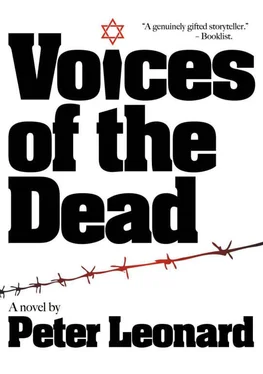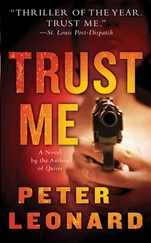“You never had a dachshund,” Rausch said. “Did you?”
Hess glanced at him, raised his eyebrows. “The dog snapped at me. ‘What is your dog’s name?’ the woman said. ‘Alfonso. We call him Fonzie.’”
“Now I understand,” Rausch said.
He was a little slow at times.
“‘Oh, how adorable,’ the woman said.
“I said to her, ‘Before I forget, here are your gloves.’
“‘I can’t thank you enough,’ Frau Kaplan said. She bent down and picked up the dog and held it against her chest.
“‘I wonder if I might trouble you for a glass of water,’ I said. She said, ‘Yes, of course, it’s the least I can do. You saw me at the cafe, yes? I know I have seen you before, reading your newspaper.’”
“And then you knew?” Rausch said.
“I thought it might happen. The urge was there. I had the Luger in the pocket of my sport jacket. The woman walked out of the room, carrying the dog. I looked around. There was a grand piano on the other side of the salon. I took off my overcoat and walked to the piano and started to play Mozart’s piano concerto number 27 in B flat major. The woman came back in smiling, carrying a glass of water, Karl the dachshund walking next to her like they were a couple. I stopped playing and said, ‘Forgive me. I see a piano I cannot resist.’
“‘Please continue,’ she said. ‘I insist. I love Mozart, so does my husband.’
“She handed me the glass of water. I took a drink and put it on a table next to the piano, and played for ten more minutes.
“The woman said, ‘Bravo.’
“I stood, picked up my overcoat, draped it over my arm and moved toward the couch. I could feel the weight of the Luger in my pocket. ‘Is your husband home?’ I said. ‘I was hoping to meet him.’
“‘No,’ she said, ‘he is at work. He is an architect.’
“‘Another time,’ I said. I picked up this small green pillow off the couch. She gave me a quizzical look. I drew the Luger and said, ‘Let’s go in the other room.’ Now the dachshund came toward me, barking. I glanced at the dog and back at the woman and she was gone. I went into the bedroom and there she was sitting on the bed with the phone in her hand.
“‘Please,’ she said. ‘I am pregnant.’
“I moved toward her and said, ‘It will be all right.’ I held the pillow in front of her face, trying to muffle the gunshot, and pulled the trigger. The pillow caught on fire and the dog went crazy.”
“What happened to the dog?” Rausch said.
“It was still barking when I walked out.”
“How many others have there been?”
9:15 in the morning, Harry got a phone call from a woman named Colette Rizik, saying she was a journalist.
“I am writing an article for a magazine called Der Spiegel about the rise of the neo-Nazis in Germany.” She spoke with a British accent. “I understand you were attacked last night.”
“Who told you that?”
“I have a contact with the police.”
Harry agreed to meet her in the hotel restaurant in an hour. He took aspirin and iced his bruised rib. It felt better today. Showered, dressed and went down to the lobby. He was sitting at a table having coffee when a good-looking woman walked in. Every head in the room — men and women — turned and looked at her. Harry, assuming it was Colette, stood up, waved and she came over. He introduced himself, invited her to sit and she took the chair to his right.
Colette Rizik was blonde, five eight, stunning. She showed him her Der Spiegel ID card. It looked official, not that Harry would’ve known if it were fake. The waitress stopped by with coffee, poured Colette a cup and refilled his. Heads were still turning, looking at her. She reached in her purse and took out a pad and a pen. She had nice hands, long thin fingers with red nails.
“Thank you for seeing me, Herr Levin. As I mentioned I am writing an article for Der Spiegel , a magazine like your Time and Newsweek.
Colette turned and took a newspaper out of her bag, unfolded it and showed Harry a short, one column article with a headline that said:
Tourists Attacked at Munich Gaststätte
Harry said, “What do you want to know?”
“It is very unusual for Blackshirts to attack tourists,” Colette said.
Harry listened, studying her. She wore a simple white blouse, collar folded over the lapels of a black blazer. He could see the swell of her breasts, the outline of her bra under the thin fabric.
“They have an agenda, you see. People they target to terrorize and harass. Did you provoke them in any way?”
“That’s what Detective Huber asked,” Harry said. “You think I picked a fight with six guys carrying ax handles?”
“I didn’t mean that.” She took the top off her pen, and wrote something on the pad. “Did you say anything to them?”
“Not a word,” Harry said. “They came in swinging.”
“What about your friend?”
“What friend?”
“I was told there were two of you.”
He watched Colette sip her coffee, red lipstick leaving a faint stain on the off-white china. She put her cup back on the saucer.
“He was just there,” Harry said. “Sitting at the bar. We started talking, found out we were both from Detroit.”
“We’re undergoing an internal crisis in Germany today. The Blackshirts are one of the subversive groups that have emerged. Most of their members are criminals, thugs and drunks without jobs or money. It reminds many Germans of a time we are still trying to forget.” She paused. “But please, Herr Levin, do not judge all Bavarians by the behavior of these fanatics. If you have time I would like to show you the good people of Munich. Are you free this evening?”
“This is what I wanted to show you,” Martz said.
Harry stared at the swastikas in black spray-paint on the wall of the synagogue.
“The neo-Nazis who attacked you also did this. They are the new SS, the new stormtroopers,” Lisa said. “I feel like it’s starting all over again.”
They had come from the cemetery where Harry’s grandfather was buried. Myron was a funny easy-going guy, always telling jokes like Harry’s uncle Sam. His grandfather’s gravestone had been spared, probably because it wasn’t particularly big or ostentatious, but random markers around it had been desecrated with black swastikas and the words Sieg Heil . Some of the headstones had been turned over or broken.
“They won’t even let the dead rest in peace,” Martz said.
Lisa drove them to her office in an old building on Brennerstrasse not far from Königsplatz. They walked up two flights of stairs, the old man breathing heavy when they got there. She opened the door and they went in.
“Welcome to the ZOB,” Lisa said. “It’s named after a Polish resistance group during World War Two, the Żydowska Organizacja Bojowa. ZOB. It’s a tribute to the parents of my partners killed by Nazis in the Warsaw Ghetto uprising. The English translation is Jewish Combat Organization, which seems appropriate since we’re still fighting the Nazis.”
There was a row of beige file cabinets lined up across the wall and bookcases filled with binders, and dozens of black-and-white photos of Nazis on a bulletin board. There was a woman on the phone at her desk. She had blonde shoulder-length hair, late thirties, plain but attractive, more so when she smiled and waved. Put her hand over the phone and mouthed something to Lisa.
“Irena, this is Harry, the boy I had a crush on when I was twelve. Harry, meet Irena Pronicheva.”
Irena nodded and went back to her phone call.
“What do you do here?” Harry said.
“Keep track of neo-Nazi activities, and try to locate war criminals. Harry, there are still Nazi murderers among us, living normal lives.”
Читать дальше












